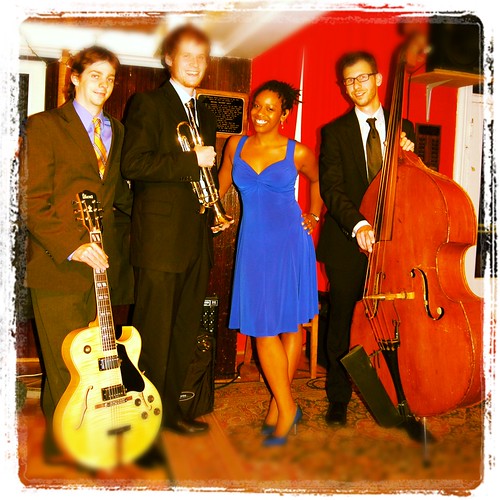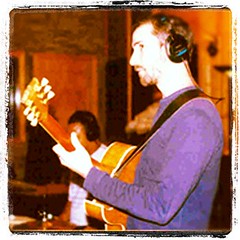
BY ZIVIT SHLANK With 2012 fully under way, the Lucky Old Souls concert series is back in action. To kick off the first concert of the year tomorrow night at Moonstone Arts Center (aka Robbins Books), LOS founder Matthew Feldman will be presenting two Philadelphia acts: The After Hours Trio + One and the Craig Ebner Quartet feat. John Swana. The former is a Philadelphia-based group headed up by singer Najwa Parkins, a recent graduate of Temple University’s Boyer College of Music and Dance, Najwa (whose name is Arabic for “secret conversation”) studied under the tutelage of vocalist Joanna Pascale and director of Jazz Studies, Terrell Stafford among others. She’s performed with such legends as saxophonist Phil Woods and pianist Bob Dorough. Najwa released her debut album Not The Next Someone Else in 2009. Craig Ebner has been performing locally and internationally for nearly two decades and has played alongside the likes of Philly’s own organist Joey DeFrancesco and drummer Byron Landham. He currently teaches in the Jazz Studies at Temple University.
PHAWKER: What initially got you two on the path to making music?
NAJWA: I grew up with lots of music in the house. My parents are from Jamaica, so I was exposed to a lot of reggae. They listened to a lot of jazz, old R&B, blues. I actually began playing trombone before I started singing. When I was 13, my teacher had a gig with vocalist Nancy Reed and when I heard her sing, I said to myself “That’s it. That’s the voice that I like, that what my voice feels like.” I started studying with her and that’s how I got here. When I first came to Philly, I didn’t really hit up the jam sessions because as a vocalist, I didn’t always feel welcome. Being in the Temple Jazz program was like being in a family and we had sessions at school or at friends’ houses. Terrell Stafford, trumpeter and director of the program, was a really great mentor. I got involved in the Temple big band and eventually made it out to Ortliebs.
CRAIG: I was into rock, that’s what I grew up on. It was in high school that I got more interested in jazz, so I auditioned for Hartt School of Music to study further. I thought I had good sense of the music, but once I got to Hartt, it was definitely an eye opening experience that forced me to decide if I was going to pursue it or not. What really got me at first wasn’t even a guitar player, it was Clifford Brown and Max Roach. I couldn’t believe people could play like that. Saxophonist Jackie McLean ran the Jazz Studies program at that time, and he was really into the history of the music and we followed that lead. The person that really got me into jazz guitar was Jim Hall. Keep in mind it was the late 80s when I attended school, so jazz was just starting to make a comeback. There weren’t really many clubs in Hartford. Within the program we we’re encouraged and given opportunities to perform and try things out,  but the program was much more insulated than Temple’s. It definitely prepared me for when I graduated. I went back and forth from Philly to NY, met and played with a lot of folks.
but the program was much more insulated than Temple’s. It definitely prepared me for when I graduated. I went back and forth from Philly to NY, met and played with a lot of folks.
PHAWKER: I know you’ve performed live quite a bit; you’re an active educator and have recorded with Tony Monaco and one of Philly’s own, organist Joey DeFrancesco, among others. Is there any particular reason why you’ve yet to record anything on your own?
CRAIG: I was playing at Ortliebs and Chris’ Jazz Café on a regular basis. I had a once a week thing going on for a while. When Chris Potter and other big names came into town, my group acted as the house band. Not only were they amazing musically, but personally as well. I was very fortunate to have been with Joey DeFrancesco for a few years. We did a lot of traveling and some recording, got involved with other projects. One of the reasons why I moved back to Philly from New York was for my children. I was really involved with them. I was still playing and practicing but wasn’t going at it as strongly. Now that they’re older, I’m back at it again and currently in talks to do my own recording.
PHAWKER: I know as artists, you constantly want to grow and evolve with your craft, but you can’t always be on point. When you’re in need of inspiration to get the juices flowing, which artist do you turn to?
NAJWA: I don’t really agree with her lifestyle, but Sarah Vaughan. She has a huge range, she really knew the music and knew how to use her instrument. She was so creative, so amazing.
CRAIG: In college, it was Jim Hall. When I graduated, I started getting into more modern players like John Scofield. Now, I’m in a place where I just enjoy playing music, so it hasn’t been difficult getting inspired. The fact that my kids are older and understand what I’m doing has reignited that spark for me.
PHAWKER: Now Najwa, What inspired the name of the group, After Hours Trio?
NAJWA: We came up with the name during our bass player Justin Sekelewski’s
Senior recital. He also loves Sarah Vaughan and she has an album with Benny Carter called After Hours. It’s a unique set up for a trio. We’ve got Dan Hanrahan on guitar and Justin on bass, no drums or piano. We added a plus one with Luke Brandon on trumpet. We’ve been working together for over 2 years now and we have a nice report and repertoire of both originals and standards.
PHAWKER: For tonight’s show at Moonstone, what can a potential audience member expect?
NAJWA: I really like sharing music. I want people to feel welcome, relax and have a good time. I really believe that anyone can enjoy jazz. I know some people have preconceived notions, but if you put out good music and good energy, people will enjoy it no matter what.
CRAIG: Pretty much what Najwa’s been saying, yeah. There’s going to be one standard that’s familiar, a couple obscure tunes. As far as the originals go, there will be one that’s inspired by my studies with this sitar player at Princeton. I got really into Indian music so I tried a few things like retuning my guitar. It’s in the style of an Indian Raga. It’s great to get to play with Philly’s own John Swana on EVI, Justin Sekelewski on bass and on drums, Carl Moritz who’s a Senior at Temple. I hope they experience something that’s a little different, something fresh and spontaneous and I hope that comes across.
